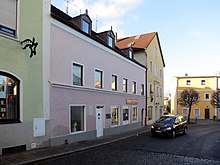Josef Furtmeier
Josef Furtmeier (born September 3, 1887 in Moosburg ; † August 28, 1969 in Freising ) is considered one of the mentors of the White Rose , especially Hans Scholl . Sophie Scholl affectionately called him the philosopher .
Life
Furtmeier was born into a master tailor's household. From 1898 he attended the Royal Humanistic Gymnasium in Freising , which he left in 1903 without a high school diploma. He worked as an assistant clerk and clerk's assistant at various local courts, in 1921 he successfully passed the examination for the middle legal service. During the First World War he did military service in France, what is now Hungary and Romania. In 1916 he was buried and suffered from stuttering for four years , around 1935 the temporary states of depression disappeared . Throughout his life, he struggled with self-doubt .
From the end of 1918 to May 1, 1919 he was a member of the KPD , in the spring of 1919 he took part in an official event in the Munich Palace of Justice. This, and the fact that he refused to use the Hitler salute, and that he did not join any National Socialist organization, led (according to him) to his being suspended from service in October 1933 on the basis of the law to restore the civil service. During the years up to 1945 he lived in Moosburg and Munich. He received a pension and had interest and rental income. However, his earnings were low compared to his last salary.
From mid-1941, Hans Scholl got in touch with Josef Furtmeier through Carl Muth and Alfred von Martin . Scholl got in touch with the architect Manfred Eickemeyer through Furtmeier . Sophie and Hans Scholl met Furtmeier regularly. Sophie Scholl reported about a conversation on June 4, 1942 at Furtmeier: "... a three-hour, non-stop and exhausting conversation was held."
After the arrest of the leading members of the White Rose, Furtmeier was also held in Gestapo detention for some time ; he was held for around three weeks - from February 28 to March 20, 1943.
Furtmeier stated in the post-war period that he had also spoken to Hans Scholl about the legitimacy of tyrannicide.
In May 1945 he became the acting mayor of Moosburg. He began investigations against former members of the NSDAP and against NS branches. At the memorial service for the victims of the White Rose in Munich in 1945, he gave a speech alongside Romano Guardini . In 1946 he joined the SPD . From 1946, first as a consultant in the Bavarian special ministry, then as a prosecutor at the Munich Appeals Chamber , he deals with denazification . His work as prosecutor of the Appeals Chamber ended December 31, 1949. For almost two years he was then deed official and head of the office of compensation Chamber at Munich and then retired.
In the post-1949 period, he tried twice to obtain promotions in reparation for his 1933 dismissal. He was refused by the ministry and was told that he had already been sufficiently compensated.
He is buried in the family grave in the cemetery in Moosburg.
Effect and appreciation
- The Moosburger Freundeskreis Josef Furtmeier created an exhibition that traces the life and work of Josef Furtmeier. The exhibition was shown in July 2012 in the Justizpalast in Munich. Charlotte Knobloch accompanied the opening with a greeting.
- In Moosburg an der Isar, the footpath between Thalbacher Straße and Poststraße and the green area at Zehentstadel will be named after Furtmeier Josef-Furtmeier-Anger in October 2012 .
- The Friends of Josef Furtmeier awarded a prize in August 2009. The prize is intended to award young people (up to 25 years of age) (individual, group, class work or projects) who show moral courage, who take a stand against right-wing extremism or xenophobia, who work for integration and international understanding.
literature
- Sönke Zankel , Christine Hikel (ed.): A companion of the Scholl siblings. The letters of Josef Furtmeier 1938-1947 . Deutscher Taschenbuch Verlag, Munich 2005, ISBN 3-423-24520-4 .
- Sönke Zankel: The White Rose was just the beginning . Böhlau, Cologne 2006, ISBN 978-3-412-09206-1 .
Web links
- Literature by and about Josef Furtmeier in the catalog of the German National Library
Individual evidence
- ^ Zankel: A companion ... 2005, p. 14
- ^ Zankel: A companion ... 2005, p. 16
- ^ Zankel: A companion ... 2005, p. 24
- ^ Zankel: A companion ... 2005, p. 25
- ^ Zankel: A companion ... 2005, p. 19 f.
- ^ Zankel: A companion ... 2005, pp. 20f
- ^ Zankel: A companion ... 2005, p. 14
- ^ Barbara Beuys: Sophie Scholl . Carl Hanser, Munich 2010, ISBN 978-3-446-23505-2 , pp. 351 .
- ^ Zankel: A companion ... 2005, p. 21
- ^ Zankel: A companion ... 2005, p. 15
- ^ Zankel: A companion ... 2005, p. 23f.
- ^ Zankel: A companion ... 2005, p. 21
- ^ Zankel: A companion ... 2005, p. 23
- ↑ Press release from the Bavarian Ministry of Justice
- ^ Süddeutsche Zeitung , October 15, 2012, Freising edition, p. R8
- ↑ Circle of Friends praises the Josef Furtmeier Prize . In: Münchner Merkur , August 30, 2009
- ↑ Flyer for the exhibition Josef Furtmeier (PDF; 1.9 MB) in February 2013 in the U-Bahn Gallery in Munich
| personal data | |
|---|---|
| SURNAME | Furtmeier, Josef |
| BRIEF DESCRIPTION | Mentor of the White Rose |
| DATE OF BIRTH | September 3, 1887 |
| PLACE OF BIRTH | Moosburg |
| DATE OF DEATH | August 28, 1969 |
| Place of death | Freising |
